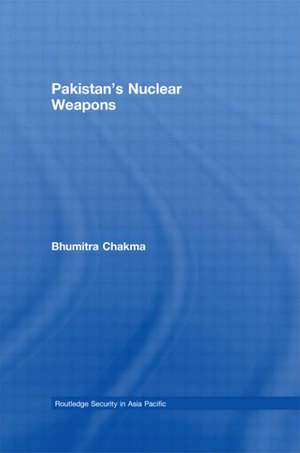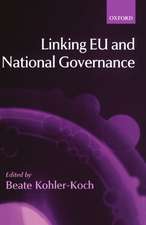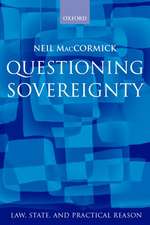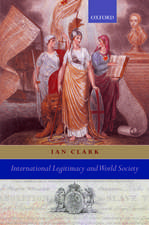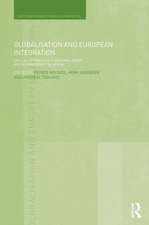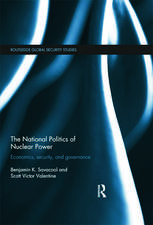Pakistan's Nuclear Weapons: Routledge Security in Asia Pacific Series
Autor Bhumitra Chakmaen Limba Engleză Paperback – iun 2010
Setting out the historical background of Pakistani nuclear development, the book examines the lessons for proliferation that can be drawn from the Pakistan case. It explains the changes and continuities of Pakistan’s nuclear policy, assessing its emerging force posture and the implications for Pakistani, South Asian and global security. It also considers the extent to which Pakistan can be said to have a nuclear doctrine, the Pakistani nuclear command and control system, and the relationship between Pakistan and the Non-Proliferation regime. Addressing the issue of whether Pakistan should be viewed as a proliferator, and the implications of a nuclear Pakistan for global terrorism, Pakistan’s Nuclear Weapons is an important study of all the major issues surrounding Pakistan’s emergence as a nuclear power.
| Toate formatele și edițiile | Preț | Express |
|---|---|---|
| Paperback (1) | 411.85 lei 6-8 săpt. | |
| Taylor & Francis – iun 2010 | 411.85 lei 6-8 săpt. | |
| Hardback (1) | 1054.75 lei 6-8 săpt. | |
| Taylor & Francis – 13 aug 2008 | 1054.75 lei 6-8 săpt. |
Din seria Routledge Security in Asia Pacific Series
-
 Preț: 326.36 lei
Preț: 326.36 lei - 18%
 Preț: 1165.73 lei
Preț: 1165.73 lei -
 Preț: 387.49 lei
Preț: 387.49 lei - 26%
 Preț: 821.87 lei
Preț: 821.87 lei -
 Preț: 390.37 lei
Preț: 390.37 lei -
 Preț: 466.29 lei
Preț: 466.29 lei - 18%
 Preț: 1167.71 lei
Preț: 1167.71 lei -
 Preț: 132.04 lei
Preț: 132.04 lei - 18%
 Preț: 1002.99 lei
Preț: 1002.99 lei -
 Preț: 261.75 lei
Preț: 261.75 lei -
 Preț: 476.60 lei
Preț: 476.60 lei -
 Preț: 485.32 lei
Preț: 485.32 lei - 14%
 Preț: 325.34 lei
Preț: 325.34 lei -
 Preț: 412.74 lei
Preț: 412.74 lei -
 Preț: 486.42 lei
Preț: 486.42 lei - 19%
 Preț: 269.76 lei
Preț: 269.76 lei - 18%
 Preț: 736.24 lei
Preț: 736.24 lei -
 Preț: 260.07 lei
Preț: 260.07 lei -
 Preț: 282.69 lei
Preț: 282.69 lei - 18%
 Preț: 1053.92 lei
Preț: 1053.92 lei -
 Preț: 483.55 lei
Preț: 483.55 lei -
 Preț: 467.44 lei
Preț: 467.44 lei -
 Preț: 463.58 lei
Preț: 463.58 lei -
 Preț: 471.25 lei
Preț: 471.25 lei - 18%
 Preț: 1227.03 lei
Preț: 1227.03 lei -
 Preț: 449.26 lei
Preț: 449.26 lei -
 Preț: 316.83 lei
Preț: 316.83 lei -
 Preț: 343.82 lei
Preț: 343.82 lei -
 Preț: 383.50 lei
Preț: 383.50 lei - 18%
 Preț: 1002.63 lei
Preț: 1002.63 lei - 43%
 Preț: 214.23 lei
Preț: 214.23 lei - 18%
 Preț: 1162.84 lei
Preț: 1162.84 lei - 18%
 Preț: 1060.52 lei
Preț: 1060.52 lei
Preț: 411.85 lei
Nou
Puncte Express: 618
Preț estimativ în valută:
78.81€ • 84.27$ • 65.71£
78.81€ • 84.27$ • 65.71£
Carte tipărită la comandă
Livrare economică 17 aprilie-01 mai
Preluare comenzi: 021 569.72.76
Specificații
ISBN-13: 9780415590327
ISBN-10: 0415590329
Pagini: 208
Dimensiuni: 156 x 234 x 11 mm
Greutate: 0.35 kg
Ediția:1
Editura: Taylor & Francis
Colecția Routledge
Seria Routledge Security in Asia Pacific Series
Locul publicării:Oxford, United Kingdom
ISBN-10: 0415590329
Pagini: 208
Dimensiuni: 156 x 234 x 11 mm
Greutate: 0.35 kg
Ediția:1
Editura: Taylor & Francis
Colecția Routledge
Seria Routledge Security in Asia Pacific Series
Locul publicării:Oxford, United Kingdom
Public țintă
Postgraduate and UndergraduateCuprins
1. Introduction 2. Pakistan’s Nuclearisation Process: Proliferation Lessons and the rise of the second nuclear age 3. Pakistan’s Emerging Nuclear Posture and Doctrinal Contemplation 4. Pakistan’s Nuclear Deterrent: Force Level and Missile Capabilities 5. Command and Control System 6. Pakistan and the Global Non-proliferation Regime 7. Proliferation Control Challenges, Nuclear Terrorism, and Pakistan 8. Conclusion
Notă biografică
Bhumitra Chakma lectures in War and Security Studies in the Department of Politics and International Studies at the University of Hull. He specialises in South Asian and global nuclear politics and ethnicity and nationalism studies. He is the author of Strategic Dynamics and Nuclear Weapons Proliferation in South Asia (2004), and has published widely in international journals, such as Modern Asian Studies, Asian Security, Asian Survey, Identity, Culture and Politics: an afro-asian dialogue etc.
Recenzii
'Chakma's detailed study offers a valuable insight into the secretive world of Pakistan's nuclear program...This book is a must read for anyone interested in understanding the rationale, objectives, and development of Pakistan's nuclear program. Summing Up: Highly recommended. All readership levels.' -- CHOICE, Sept. 2009 Vol. 47 No. 01
'This book makes an important contribution to the growing literatures on the fragility of the Pakistani state by focussing on an under-studied subject area: its emerging nuclear posture.]...[a valuable resource on probably the most important challenge facing the international community at the present juncture.' - Harsh Pant, Asian Affairs, March 2010
"Bhumitra Chakma's work is a timely and valuable addition to the existing literature in this area." - Rajshree Jetly, Pacific Affairs: Volume 84, No. 2 - June 2011
'This book makes an important contribution to the growing literatures on the fragility of the Pakistani state by focussing on an under-studied subject area: its emerging nuclear posture.]...[a valuable resource on probably the most important challenge facing the international community at the present juncture.' - Harsh Pant, Asian Affairs, March 2010
"Bhumitra Chakma's work is a timely and valuable addition to the existing literature in this area." - Rajshree Jetly, Pacific Affairs: Volume 84, No. 2 - June 2011
Descriere
Pakistan is a vitally important country in the contemporary global political system. This book provides a comprehensive study of a nuclear-armed Pakistan, investigating the implications of its emergence as a nuclear weapons state.
